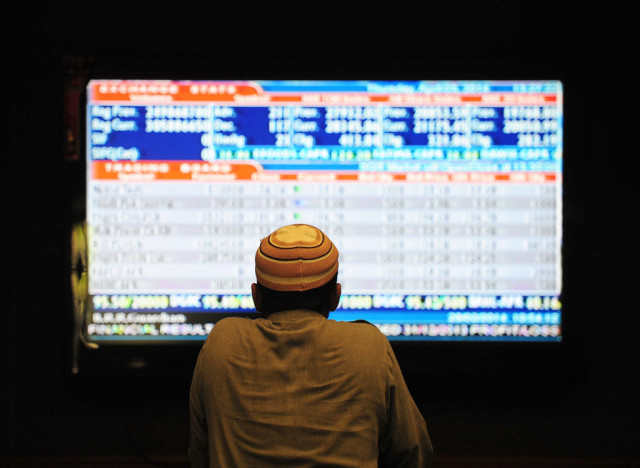Market talk: Learn how to speculate
Buy shares that trade below average, sell ones that are above average.

The screen tells you everything. All you have to do now for tomorrow’s trade is identify the shares which are trading above the average and the shares which are trading below the average. PHOTO: AFP/FILE
Begin with the fact that the trading average shows you how to proceed. It is a mathematically proven fact that if the average is higher than the prevailing rate, the share has to rise to the level of the average.
Now here you are before the screen. Picture this, the screen is showing you the averages but you are ignoring the message. People who sit before the screen ask the Karachi Automated Trading System (KATS) operators “Yehaan pe limit laga do” (Place the limit on this level). Although the Karachi stock market is the biggest market, the same rules apply to lots in Lahore and Islamabad.
But you are there before the screen. Nothing can take place without you witnessing it. Every day you see this idiocy – whereas the screen is telling you everything when to buy and when to sell.
Simple rule – when the ruling value is below the average, buy! When the ruling value is above the average, sell! All this advice about “buy on weakness and sell on strength” is hogwash.
The screen tells you everything. All you have to do now for tomorrow’s trade is identify the shares which are trading above the average and the shares which are trading below the average.
Come early to the market and place your bets. Say loud and clear “Lao maal” (Get the show on the road!). You can’t go wrong.
And here is some other advice. “When you speculate, speculate big. Don’t hesitate. Back your judgement.”
It has to be a straight choice between being a big fish in a small pond or a big fish in a big pond. Let the size of the pond be determined by you and your will power. Let others come to you to settle.
The big fish is the king. You have to listen to his advice. There is no escape. Let me give you examples — these are from real life. Take the life story of the Guru of India, Ambani. He wanted to be a big fish in a big pond. He defined the size of the pond, the rest is history.
Today, the Indian market revolves around Ambani. These brothers and the property they own are a legend. Think Mumbai. Think Ambani. He owns it.
Imagine having to hold a shareholder meeting in a football field and still have no place for latecomers. Of such initiatives are winners born.
The Securities and Exchange Board of India (SEBI) had to drop all charges against Ambani. The press and the shareholders would not accept any other verdict. He had won, SEBI had lost. Not only that, SEBI had to apologise. Such were the footprints of Ambani.
Here is another example:
When I was teaching at the IBA, Asma Riaz and her husband were my students and the husband had speculated in a script that was being squeezed by the professionals. I sold the shares of her husband. And he was very unhappy. He was searching all over the IBA to kill me.
I told him, in two to three days, I will get him back the shares and he will make a profit. I am still alive to tell the story.
So come early to the market and bust the bank. Place huge bets. Collect huge profits. The market is telling a story. Listen to it.
Every day is a new day. The market is forever young. Let’s get started! Get the show on the road!
How many ways are there to achieve the sum of zero? Let me give you some examples:
100=90+10, 100=80+20, 100=70+30 and 100=100+0. The point is whichever way you total it. The sum will always be zero. Valuation in the end is a zero-sum game.
“Be greedy when others are fearful and fearful when others are greedy.” Easier said than done for the vast majority of stock traders. On every stock trade, there is someone who wants to sell and someone who wants to buy, at least at a particular price. The person who is selling thinks that he is getting out just in time while the person buying thinks that he is about to make good money.
The truth is that the market doesn’t really reflect some magical perfect valuation of a stock under the efficient market hypothesis. It reflects the mass consensus of how actual individual investors value the stock. It is the sum of everyone’s hopes and fears.
The writer is the chairman of Ace Securities
Published in The Express Tribune, April 14th, 2014.
Like Business on Facebook, follow @TribuneBiz on Twitter to stay informed and join in the conversation.



















COMMENTS
Comments are moderated and generally will be posted if they are on-topic and not abusive.
For more information, please see our Comments FAQ